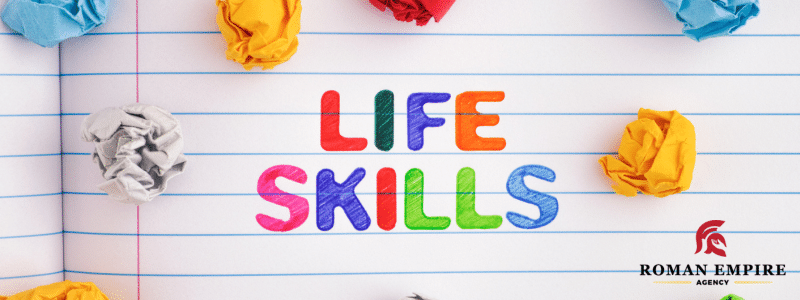
While skills like food preparation and personal hygiene may come easy to most, people on the autism spectrum might need specialized assistance and essential life skills training.
In this blog, we’ll look at the following:
- Why are life skills important?
- 5 most important life skills
- How do you teach an autistic adult life skills?
- Roman Empire’s Independent Living Skills Training
Why Are Life Skills Important?
Life skills allow us to make independent daily living decisions while managing life in a safe and healthy way. They help us in all areas, including our social, professional, and personal lives. We are more self-sufficient when we know how to care for ourselves, communicate with others, and navigate our environment.
For those with developmental disabilities such as autism, life skills expand their scope of living and offer them the same opportunities as those who are neurotypical. Having your own home, job, and even significant other brings a sense of pride and fulfillment to your life.
5 Most Important Life Skills

1. Executive Functioning
Executive functioning includes planning, organization, problem-solving, and time management skills. Having optimal executive functioning means you can plan ahead, meet goals, and follow step by step directions while maintaining self-discipline. Having executive functioning skills is essential for success in school and obtaining and maintaining a job.
2. Self Care
Knowing how to take care of yourself in everyday life is important. This means practicing self-care skills like brushing your teeth, showering, getting dressed, eating healthy foods, exercising, and participating in hobbies. Neglecting certain practices can lead to physical health consequences (e.g., cavities from not brushing teeth).
Self-care encompasses all parts of a person’s health: Physical, mental, emotional, and spiritual. Because of this, it’s equally necessary to take part in beneficial self-care like fun activities or meditation that enhance mental health and emotional well-being.
3. Daily Living Skills
Daily living skills are vital to being a responsible and independent adult. These skills include grocery shopping, driving a car, cooking and meal prepping, cleaning (vacuuming, dusting, mopping), packing a school or work bag, and so on. Depending on where a person is on the spectrum, some skills, like driving a car or being fully independent, may not be practical. Still, everyone can learn some, if not all, daily living skills and improve their quality of life.
4. Social and Communication Skills
Social and communication skills are beneficial no matter where you are in life. Everyone needs to know how to collaborate with others, communicate their wants and needs, and build relationships, whether you’re in the classroom, workplace, or spending time with friends and family.
Social skills focus on developing meaningful relationships, including initiating interactions with others, responding to others, maintaining eye contact, understanding verbal and non-verbal social cues, and practicing empathy. Effective communication allows an individual to be understood and to understand others. This might look like actively listening and exchanging thoughts and concepts.
5. Self Advocacy
You’re more likely to receive support from others at a young age, whether it be a parent, guardian, or attentive teacher. As you get older, you become more and more responsible for speaking and standing up for yourself. For adults with autism, it’s important that they advocate for their needs.
Self-advocacy as a skill includes making your own decisions, reaching out to others for help, and asking questions when needed. For example, some people with autism may learn better in a quiet environment and need to ask their professor about remote learning or being a part of a smaller classroom.
How Do You Teach an Autistic Adult Life Skills?
Therapists and researchers have found that teaching life skills to autistic adults is much more effective in natural environments. In other words, the skill they’re learning should fully correlate with the environment they’re learning it in. If a person is learning how to cook, this should be done in their own kitchen or a kitchen they’re familiar with. Likewise, they should learn to grocery shop by going to the store and walking down aisles, searching for the items on their pre-made list.
Each person is unique, including those with ASD. How a person learns best will come down to the individual. Some individuals with autism may learn better using visuals, especially if they have a co-occurring auditory processing disorder. In the same way, an autistic person who struggles with ADHD-like symptoms may need to incorporate stimming tools into learning to maintain focus.
Regardless of a person’s conditions and skills needing to be developed, they’ll always learn best using a teaching approach individualized to their needs.
Roman Empire’s Independent Living Skills Training
At Roman Empire Agency, we offer Independent Living Skills Training (ILS) to all our consumers with developmental disabilities. ILS targets the essential life skills for which developmental disabilities can create barriers.
While many individuals with developmental disabilities grow up in a supportive home that assists them with learning life skills, this isn’t always the case. For those who gain little to no support in childhood, adulthood can bring severe challenges and difficulties concerning independence.
Even for those who had support in their childhood, some skills may need a professional or more direct approach to develop. Regardless of one’s upbringing and level of independence, Roman Empire is here to support our consumers wherever they may need it with living skills, including but not limited to:
- Basic Math & Reading
- Communication Skills
- Community & Home Safety
- Health & Nutrition
- Housing Assistance
- Medication Management
- Money Management
- Organization & Cleaning
- Personal Care
- Personal Hygiene & Health
- Problem-Solving
- Self Advocacy Training
- Social Integration Skills
Teaching life skills to children and adults with developmental disabilities not only aids with external accomplishments but internal as well. Completing daily tasks is rewarding, especially for those who worked hard to learn each skill.
We want our consumers to meet their goals and live the independent lives they desire. Our team of compassionate and dedicated experts helps our consumers gain new skill sets through hard work, task analysis, and an individualized plan.
Published on: October 18, 2022
Updated on: September 27, 2023






